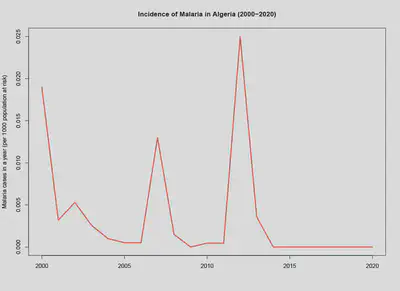2019

Overview
Algeria was WHO certified malaria-free in 2019 with the last indigenous case being reported in 2013. In the 1960s, malaria became the primary health challenge in Algeria with approximately 80,000 cases per year. Malaria incidence then gradually decreased over the next 40 years to 28,000 cases per year with the use of free diagnosis and treatment for malaria, multisectoral vector control like indoor residual spraying and diversified antilarval control, and well-trained dedicated staffing at the national and subnational levels. Algeria’s continued malaria elimination efforts through dynamic and epidemiologic surveillance systems as well as an established national surveillance laboratory and free malaria chemoprophylaxis to travelers have allowed the country to achieve malaria elimination.
Malaria Incidence in Algeria (2000-2020)
| Year | Incidence of malaria (per 1,000 population at risk) |
|---|---|
| 2000 | 0.018646 |
| 2001 | 0.003248 |
| 2002 | 0.005344 |
| 2003 | 0.002638 |
| 2004 | 0.001041 |
| 2005 | 0.000514 |
| 2006 | 0.000506 |
| 2007 | 0.012955 |
| 2008 | 0.001471 |
| 2009 | 0 |
| 2010 | 0.000473 |
| 2011 | 0.000464 |
| 2012 | 0.025046 |
| 2013 | 0.003571 |
| 2014 | 0 |
| 2015 | 0 |
| 2016 | 0 |
| 2017 | 0 |
| 2018 | 0 |
| 2019 | 0 |
| 2020 | 0 |
References
Ba, O., Ouldabdallahi, M., Koïta, M., Sy, O., & Dahdi, S. A. (2018). Epidemiology of malaria and elimination prospects in Maghreb Countries. La Tunisie Medicale, 96(10-11), 590-598.
World Health Organization. (2019). WHO Algeria and Argentina certified as malaria-free. Wkly Epidemol Rec.
World Health Organization. (2021). Zeroing in on malaria elimination: final report of the E-2020 initiative. World Health Organization. https://apps.who.int/iris/handle/10665/340881 . License: CC BY-NC-SA 3.0 IGO